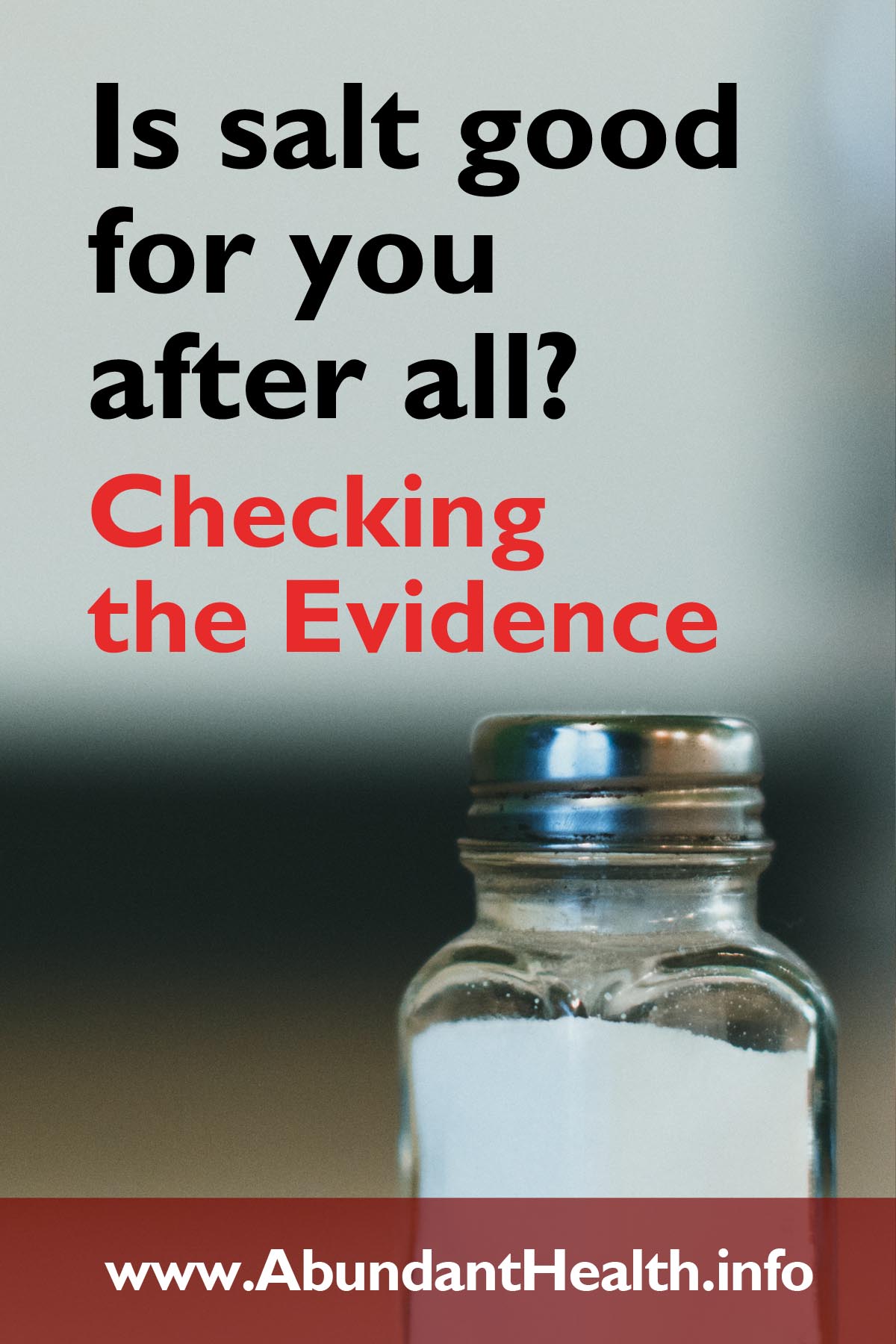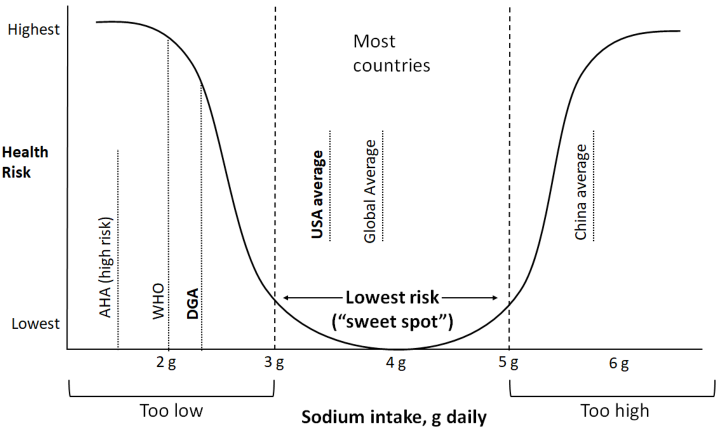Salt is the most common form of sodium and is added to food during manufacturing, home cooking or at the table to enhance the taste or to extend the shelf life. Most people have heard the advice to cut down on salt. That’s because high sodium intakes are associated with high blood pressure, a major risk factor for cardiovascular disease, heart attacks and strokes.1)Graudal NA, Hubeck-Graudal T, Jurgens G. Effects of low sodium diet versus high sodium diet on blood pressure, renin, aldosterone, catecholamines, cholesterol, and triglyceride. Cochrane Database Syst Rev. 2020 Dec 12;12(12):CD004022. doi: 10.1002/14651858.CD004022.pub5.

So the recent headline “Food myths busted: dairy, salt and steak may be good for you after all” was bound to grab-attention.2)Food myths busted: dairy, salt and steak may be good for you after all. The Guardian, September 6, 2021
In the research article this headline is based on, the authors examined whether advice to substantially lower sodium intakes was supported by robust evidence.3)Mente A. Sodium Intake and Health: What Should We Recommend Based on the Current Evidence? Nutrients2021, 13(9), 3232; https://doi.org/10.3390/nu13093232
The article’s premise is that current advice to limit sodium consumption to 2.3 grams a day is unachievable for most people in the long term. And it claims there isn’t good quality evidence to show lower salt intakes reduce the risk of heart attacks and strokes.
The authors suggest that current global sodium intakes, which range from 3-5 grams per day, are associated with the lowest risks for a heart attack, stroke or dying prematurely. And that heart attacks and strokes increase only when sodium intakes are higher or lower than this.

The researchers argue there’s a ‘sweet spot’ for salt intake and heart disease risk. We will check the evidence.
But there are a number of controversies about these claims, and the existing advice to limit salt consumption remains. Lets take a closer a look at some of the issues associated with these claims, as well as important research the authors missed.
Most of us could afford to cut down on salt
One teaspoon of salt weighs around 5 grams and contains 2 grams of sodium.
Americans consume about 3.6 grams of sodium per day, equivalent to 9.2 grams (about 2 teaspoons) of table salt.
This is higher than the suggested dietary target of 2 grams of sodium (5 grams of salt) per day and the adequate intake range of 460-920 milligrams (1.3-2.6 grams of salt) a day.4)Nutrient Reference Values for Australia and New Zealand: Sodium
Antmann E M et.al. Stakeholder discussion to reduce population-wide sodium intake and decrease sodium in the food supply: a conference report from the American Heart Association Sodium Conference 2013 Planning Group. DOI: 10.1161/CIR.0000000000000051
Sodium intakes in the US are similar to the rest of the world. Data from 66 countries, accounting for three-quarters of the world’s adult population, reported the average sodium consumption is 3.95 grams per day and ranges from 2.2 to 5.5 grams per day.5)Mozaffarian D, et. al. Global Burden of Diseases Nutrition and Chronic Diseases Expert Group. Global sodium consumption and death from cardiovascular causes. N Engl J Med. 2014 Aug 14;371(7):624-34. doi: 10.1056/NEJMoa1304127.
Yes, it’s possible to cut down on salt
Changing individual behaviour long term is challenging. But it’s possible.
A 2017 systematic review of dietary salt-reduction interventions found individual dietary counselling could reduce a person’s salt consumption by about 2 grams a day (equivalent to 780mg of sodium), over time periods up to five years.6)Hyseni L et. al. Systematic review of dietary salt reduction policies: Evidence for an effectiveness hierarchy? PLoS One. 2017 May 18;12(5):e0177535. doi: 10.1371/journal.pone.0177535.
Population-wide strategies that include reformulating manufactured food with lower levels of salt, improved labelling and mass media education were even more effective in some regions, reducing average salt intakes by around 4 grams a day in Finland and Japan.7)Hyseni L, Elliot-Green A, Lloyd-Williams F, Kypridemos C, O’Flaherty M, McGill R, Orton L, Bromley H, Cappuccio FP, Capewell S. Systematic review of dietary salt reduction policies: Evidence for an effectiveness hierarchy? PLoS One. 2017 May 18;12(5):e0177535. doi: 10.1371/journal.pone.0177535.

The authors of the above mentioned paper highlight a lack of studies in the population showing they’ve achieved dietary sodium intakes of less that 2.3 grams per day. But this fails to acknowledge the challenges in conducting such a study to test that, or the importance of reducing your sodium intake relative to what you usually consume.
Cutting salt lowers your risk of heart disease
A recently published randomised trial across 600 villages in rural China shows cutting salt intakes can reduce a person’s risk of cardiovascular disease, heart attack and stroke.8)Neal B, et. al. Effect of Salt Substitution on Cardiovascular Events and Death. N Engl J Med. 2021 Sep 16;385(12):1067-1077. doi: 10.1056/NEJMoa2105675.
The study included more than 20,000 people with high blood pressure who either had a history of stroke or were aged over 60 years. One group was randomly assigned to use a salt substitute to reduce their sodium intake. The second group continued to use regular salt. Both groups were followed up over five years.
The intervention led to a reduction in sodium excreted in the urine (indicating complicance) and a reduction in blood pressure.
The rate of any major cardiovascular event, including heart attack, was 13% lower among those in the salt-substitute group compared to the regular salt group. The rate of strokes was 14% lower.
This trial demonstrates the benefit of reducing dietary sodium intakes, irrespective of a specific daily target.
Is it risky to have too little salt?
Humans need sodium to maintain essential bodily processes such as fluid volume and cell stability. Sodium levels are balanced though a sensitive system of hormones, chemical processes and nerves to ensure that sodium in excess of needs is excreted in the urine.
There is conflicting evidence about heart health when you have very low sodium intakes. Some researchers have suggested there is a J-shaped relationship, where both low and very high intakes increase the risk of poor outcomes (the end of a “J” shape), while the lowest risk is across a broad mid-point of salt intake (the curve in the “J”).

The J-shaped curve in some studies on salt and blood pressure can be explained by issues such as measurement error, random variation, other differences (in age, sex, smoking status or socioeconomic status), existing dietary patterns or other health problems, interactions between a major sodium reduction, and the body’s physiological pathways that regulate blood pressure.9)Cook NR, He FJ, MacGregor GA, Graudal N. Sodium and health-concordance and controversy. BMJ. 2020 Jun 26;369:m2440. doi: 10.1136/bmj.m2440.
Or it could be explained by reverse causation, where the people recruited into the study report low sodium intakes because they have already been advised to follow a low salt diet before enrolling in the trial.
While we wait for more research to explaining discrepancies related to a J-shape curve, the evidence overwhelmingly finds lower sodium intakes, compared to higher intakes, lead to important reductions in blood pressure.10)Graudal NA, Hubeck-Graudal T, Jurgens G. Effects of low sodium diet versus high sodium diet on blood pressure, renin, aldosterone, catecholamines, cholesterol, and triglyceride. Cochrane Database Syst Rev. 2020 Dec 12;12(12):CD004022. doi: 10.1002/14651858.CD004022.pub5.

Stay Always Up to Date
Sign up to our newsletter and stay always informed with news and tips around your health.
This article is republished from The Conversation under a Creative Commons license. Read the original article.

Clare Collins is a Laureate Professor of Nutrition and Dietetics in the School of Health Sciences, College of Health, Medicine and Wellbeing at the University of Newcastle, NSW, Australia and NHMRC Research Leadership Fellow.
References
| ↑1 | Graudal NA, Hubeck-Graudal T, Jurgens G. Effects of low sodium diet versus high sodium diet on blood pressure, renin, aldosterone, catecholamines, cholesterol, and triglyceride. Cochrane Database Syst Rev. 2020 Dec 12;12(12):CD004022. doi: 10.1002/14651858.CD004022.pub5. |
|---|---|
| ↑2 | Food myths busted: dairy, salt and steak may be good for you after all. The Guardian, September 6, 2021 |
| ↑3 | Mente A. Sodium Intake and Health: What Should We Recommend Based on the Current Evidence? Nutrients2021, 13(9), 3232; https://doi.org/10.3390/nu13093232 |
| ↑4 | Nutrient Reference Values for Australia and New Zealand: Sodium Antmann E M et.al. Stakeholder discussion to reduce population-wide sodium intake and decrease sodium in the food supply: a conference report from the American Heart Association Sodium Conference 2013 Planning Group. DOI: 10.1161/CIR.0000000000000051 |
| ↑5 | Mozaffarian D, et. al. Global Burden of Diseases Nutrition and Chronic Diseases Expert Group. Global sodium consumption and death from cardiovascular causes. N Engl J Med. 2014 Aug 14;371(7):624-34. doi: 10.1056/NEJMoa1304127. |
| ↑6 | Hyseni L et. al. Systematic review of dietary salt reduction policies: Evidence for an effectiveness hierarchy? PLoS One. 2017 May 18;12(5):e0177535. doi: 10.1371/journal.pone.0177535. |
| ↑7 | Hyseni L, Elliot-Green A, Lloyd-Williams F, Kypridemos C, O’Flaherty M, McGill R, Orton L, Bromley H, Cappuccio FP, Capewell S. Systematic review of dietary salt reduction policies: Evidence for an effectiveness hierarchy? PLoS One. 2017 May 18;12(5):e0177535. doi: 10.1371/journal.pone.0177535. |
| ↑8 | Neal B, et. al. Effect of Salt Substitution on Cardiovascular Events and Death. N Engl J Med. 2021 Sep 16;385(12):1067-1077. doi: 10.1056/NEJMoa2105675. |
| ↑9 | Cook NR, He FJ, MacGregor GA, Graudal N. Sodium and health-concordance and controversy. BMJ. 2020 Jun 26;369:m2440. doi: 10.1136/bmj.m2440. |
| ↑10 | Graudal NA, Hubeck-Graudal T, Jurgens G. Effects of low sodium diet versus high sodium diet on blood pressure, renin, aldosterone, catecholamines, cholesterol, and triglyceride. Cochrane Database Syst Rev. 2020 Dec 12;12(12):CD004022. doi: 10.1002/14651858.CD004022.pub5. |
But my question is “what salt” is the best to use. My daughter says she’s read we shouldn’t use the Iodine reg. salt at all and that sea salt is best and others say the “red salt” and can’t remember what its called is best. What’s your thoughts” Ginny
Yes Himalaya salt, other red salts, sea salt, they are all good. Maybe I should be writing a separate article about that.
Because I have heard that sea salt is good, I’ve purchased sea salt with iodine.
Is there any problem with that kind of salt. I understand that we need some iodine
in our diet. Please clarify & Thanks in advance!
Yes Iodine is important for your health. And you can make use of this salt. But like any other salt, you should consume it in moderation. I think that is the most important thing.